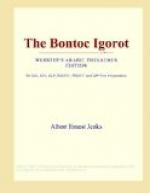I was once present at an Igorot trial when the question to be decided was whether a certain man or a certain woman had lied. The old men examined and cross-questioned both parties for fully a quarter of an hour, at which time they announced that the woman was the liar. Then they brought a test to bear evidence in binding their decision. They killed a chicken and cut it open. The gall was found to be almost entirely exposed on the liver — clearly the woman had lied. She looked at the all-knowing gall and nodded her acceptance of the verdict. If the gall had been hidden by the upper lobe of the liver, the verdict would not have been sustained.
If a person steals palay, the injured party may take a sementera from the offender.
If a man is found stealing pine wood from the forest lands of another, he forfeits not only all the wood he has cut but also his working ax.
The penalty for the above two crimes is common knowledge, and if the crime is proved there is no longer need for the old men to make a decision — the offended party takes the customary retributive action against the offender.
Cases of assault and battery frequently occur. The chief causes are lovers’ jealousies, theft of irrigating water during a period of drought, and dissatisfaction between the heirs of a property at or shortly following the time of inheritance.
It is customary for the old men of the interested ato to consider all except common offenses unless the parties settle their differences without appeal.
A fine of chickens, pigs, sementeras, sometimes even of carabaos, is the usual penalty for assault and battery.
Adultery is not a common crime. I was unable to learn that the punishment for adultery was ever the subject for a council of the old men. It seems rather that the punishment — death of the offenders — is always administered naturally, being prompted by shocked and turbulent emotions rather than by a council of the wise men. In Igorot society the spouse of either criminal may take the lives of both the guilty if they are apprehended in the crime. To-day the group consciousness of the penalty for adultery is so firmly fixed that adulterers are slain, not necessarily on the spur of the moment of a suspected crime but sometimes after carefully laid plans for detection. A case in question occurred in Suyak of Lepanto Province. A man knew that his faithless wife went habitually at dusk with another man to a secluded spot under a fallen tree. One evening the husband preceded them, and lay down with his spear on the tree trunk. When the guilty people arrived he killed them both in their crime, thrusting his spear through them and pinning them to the earth.
Among a primitive people whose warfare consists much in ambushing and murdering a lone person it is not always possible to predict whether the taking of human life will be considered a criminal act or an act of legitimate warfare.




